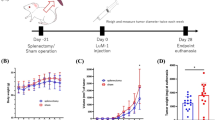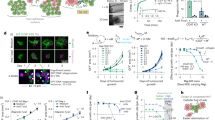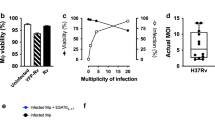Abstract
The effects of the host's immune response on metastatic spread was investigated by observing the numbers of pulmonary metastases that developed from an s.c. implant of the Lewis lung carcinoma in C57BL mice in which different cell populations had been suppressed. Macrophage function was impaired by treatment with silica (Si), cortisone acetate (CA), or trypan blue (TB). T-cell function was depressed by adult thymectomy and sublethal irradiation, or by treatment with antilymphocyte serum (ALS). Metastasis was significantly increased and phagocytic activity decreased by Si and CA, but were unaffected by TB. Thymectomy and irradiation had no effect on metastases, whereas ALS when given before, but not after tumour growth, reduced their number. The antimetastatic action of the immunopotentiating agent C. parvum was investigated in these immunologically impaired mice. It was unaffected by Si, CA or TB. However, the inhibiting effect of these agents on phagocytic activity was overcome by treatment with C. parvum. Its antimetastatic action was unaffected in mice which had been thymectomized and irradiated, but could be abrogated by ALS. However, ALS was only able to prevent this activity if given before tumour growth, it was ineffective if given after tumour growth. This study showed that metastatic spread was inversely related to phagocytic activity. The antimetastatic effect of C. parvum appears to be mediated through macrophages in concert with a subpopulation of T lymphocytes, which were considered to be necessary in the sensitization arm of the response as opposed to the effector arm of this response.
This is a preview of subscription content, access via your institution
Access options
Subscribe to this journal
Receive 24 print issues and online access
$259.00 per year
only $10.79 per issue
Buy this article
- Purchase on Springer Link
- Instant access to full article PDF
Prices may be subject to local taxes which are calculated during checkout
Similar content being viewed by others
Rights and permissions
About this article
Cite this article
Jones, P., Castro, J. Immunological mechanisms in metastatic spread and the antimetastatic effects of C. parvum. Br J Cancer 35, 519–527 (1977). https://doi.org/10.1038/bjc.1977.85
Issue Date:
DOI: https://doi.org/10.1038/bjc.1977.85
This article is cited by
-
Role of macrophages in the host response to Lewis lung peritoneal carcinomatosis
Cancer Immunology Immunotherapy (1994)
-
Macrophages and cancer
Cancer and Metastasis Reviews (1990)
-
Macrophages in cancer metastases and their relevance to metastatic growth
CANCER AND METASTASIS REVIEW (1983)
-
Immunology of metastasis
CANCER AND METASTASIS REVIEW (1983)



